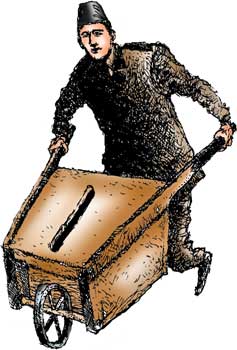 First, it was the Supreme Court's impending ruling on the dissolution of the House of Representatives. Then it was the uncivil war in the Nepali Congress. Until last week, we thought it was the November 23 elections. Now our political future appears to hinge on what the authors of Article 127 of the constitution actually had in mind.
First, it was the Supreme Court's impending ruling on the dissolution of the House of Representatives. Then it was the uncivil war in the Nepali Congress. Until last week, we thought it was the November 23 elections. Now our political future appears to hinge on what the authors of Article 127 of the constitution actually had in mind. Thinkers of all persuasions have been ruminating over whether the House of Representatives could or should be restored by a royal palace order in case the elections cannot be held on schedule. Even before you could start wondering whether that would amount to contempt of court, a newly retired Supreme Court justice jumped in to say his old office has the sole prerogative to revive the Lower House. Since the man also happened to be a member of the panel that drafted the constitution, his repeated pleas for a public debate on the matter warrant consideration.

At the other end, a palace-nominated Upper House member was forced to step down after his idea of a grand coalition including the Maoists under Article 127 sounded too outlandish even to his peers. Since the gentleman used to be the army's top legal expert, there's little to suggest he didn't know what he was talking about. He had to pay the price for thinking out aloud a bit too prematurely. Case dismissed. Now it turns out that the manner in which his resignation was tendered and accepted was glaringly unconstitutional.
With post-1990 political life having been defined too extensively by articles, barristers and clauses, it's remarkable we don't have a separate constitutional court. The constitution used to be the last refuge of politicians in the past, too. The much-maligned palace take-over of 16 December, 1960 was in conformity with Article 55 of the basic law of the day. Weeks after the restoration of multiparty democracy three decades later, key commanders of the People's Movement conceded that Marich Man Singh Shrestha's government was upholding the partyless constitution while mowing down pro-multiparty multitudes. Since constitutional correctness doesn't necessarily translate into prudent politics, some introspection is in order.
Part of the country is already doing that. Politicians can't stop apologising for allowing their obsession with achieving democracy to infect their ability to preserve it.
Since the Commission for Investigation of Abuse of Authority raids, bureaucrats have started reviewing whether it was a good idea to accept political fund-raising as part of the job description. Other institutions and individuals are busy blaming each other for national degeneration. The robustness of these deliberations cannot compensate for the reticence of the people.
During the three decades of disorganised politics, there was an incentive to keep quiet. Critical thinking invariably brought trouble. The letter and spirit of today's constitution allow us to holler as loud as we want, but there is an ominous apathy. The political class may not have enshrined its right to ignore us while allowing us to speak. But many of our leaders must have expected us to eventually recede into silence. We mustn't hand them an easy victory by drifting into self-pity.
When the constitution vested sovereignty in the people, it presupposed our perpetual predominance. We, the people, have a responsibility that transcends keeping track of the latest arms deal or speculating about who might switch camps the next in the three major political parties. Too bad voting isn't compulsory in Nepal. That's another good reason to re-activate the people.
A citizens' election compact might be a good beginning. Each household with three eligible voters should pledge to send at least one to the polling station. The elderly, sick and conscientious objectors can qualify for exemption. In several districts, getting people out to vote could prove hazardous. Mail-in ballots could be a good answer, but it's probably too late for this election. Unless postal workers can liaise with the Election Commission to work out a delivery and collection schedule that would meet the constitutional deadline.
A better idea might be to have neighbourhood committees run mobile polling stations, complete with all-party representation, and go from door to door. If this sounds unworkable-and even undemocratic-consider how much faith we put in our Census Bureau enumerators. Their work determines everything between the voting-age population and the number of MPs each district can send. As for voter turn-out, does that matter when the system is at stake?


